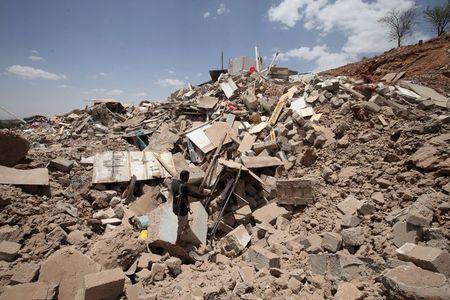Advertisement
Arab war planes bomb Houthi positions throughout Yemen
SANAA (Reuters) - Aircraft from a Saudi-led coalition bombed Yemen's Houthi rebels throughout the country on Sunday, residents said, a day after border clashes killed a Saudi serviceman.
The raids hit an air base near Sanaa airport and a military installation aligned with the Houthis overlooking the presidential palace compound in the capital Sanaa.
The Houthis' TV channel al-Masira said the coalition had launched 25 air strikes on the main Houthi provinces of Saada and Hajja along the kingdom's border, without giving details, and said Saudi ground forces were also shelling the areas.
Residents in Saada confirmed to Reuters by telephone that Houthi positions were heavily bombed by war planes, but there was no immediate confirmation by Saudi authorities.
In the central city of Taiz, also a main battleground between armed Hadi loyalists and Houthi militiamen, residents reported Arab air strikes on Houthi forces gathered in a historic mountaintop fortress and a nearby special forces base.
The Saudi-led coalition began air strikes in Yemen in March in a campaign to restore Yemeni President Abd-Rabbu Mansour Hadi to power. He fled in March, after Iranian-backed Houthi rebels seized the capital Sanaa in September and then thrust into central and south Yemen.
CLUSTER BOMBS
Heavy artillery clashes along Yemen's border with the kingdom have increased as the war enters its ninth week.
Houthi TV reported that the rebels fired 20 rockets at Saudi Arabia's southwestern border city of Najran on Saturday.
A Saudi Ministry of Interior spokesman said a border guard was killed and seven others were wounded on Saturday in the Najran region due to rocket attacks from inside Yemen.
The United Nations has said that more than 1,976 people have been killed and more than 8,000 wounded in the conflict since March 19.
Human Rights Watch said in a report on Sunday that three bombings it had investigated in the northern province of Saada used cluster bombs, which are banned by most countries, adding that it suspected the munitions were fired by Saudi-led forces.
Two of the alleged attacks in April wounded at least six Yemenis, including a 10-year old boy, but another incident on May 23 did not cause any casualties, it said.
"These weapons can't distinguish military targets from civilians, and their unexploded submunitions threaten civilians, especially children, even long after the fighting," said Ole Solvang, senior researcher at Human Rights Watch.
Saudi officials did not provide an immediate response to the report.
(Reporting by Mohamed Ghobari; Writing by Noah Browning and Amena Bakr; Editing by Greg Mahlich)



















Add new comment